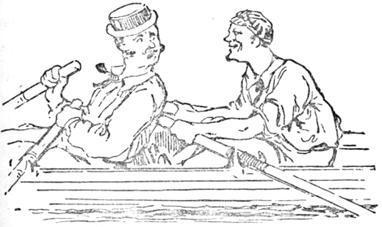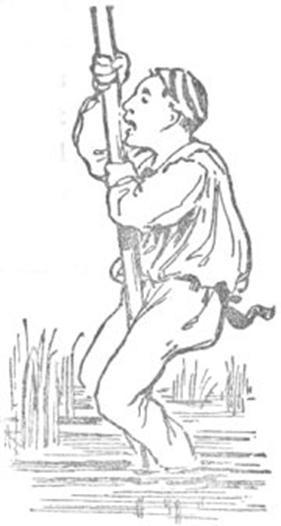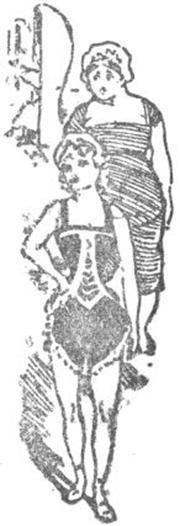Delphi Complete Works of Jerome K. Jerome (Illustrated) (Series Four) (26 page)
Read Delphi Complete Works of Jerome K. Jerome (Illustrated) (Series Four) Online
Authors: Jerome K. Jerome

To see two novices try to keep time with one another is very amusing. Bow finds it impossible to keep pace with stroke, because stroke rows in such an extraordinary fashion. Stroke is intensely indignant at this, and explains that what he has been endeavouring to do for the last ten minutes is to adapt his method to bow’s limited capacity. Bow, in turn, then becomes insulted, and requests stroke not to trouble his head about him (bow), but to devote his mind to setting a sensible stroke.

“Or, shall
I
take stroke?” he adds, with the evident idea that that would at once put the whole matter right.
They splash along for another hundred yards with still moderate success, and then the whole secret of their trouble bursts upon stroke like a flash of inspiration.
“I tell you what it is: you’ve got my sculls,” he cries, turning to bow; “pass yours over.”
“Well, do you know, I’ve been wondering how it was I couldn’t get on with these,” answers bow, quite brightening up, and most willingly assisting in the exchange. “
Now
we shall be all right.”
But they are not — not even then. Stroke has to stretch his arms nearly out of their sockets to reach his sculls now; while bow’s pair, at each recovery, hit him a violent blow in the chest. So they change back again, and come to the conclusion that the man has given them the wrong set altogether; and over their mutual abuse of this man they become quite friendly and sympathetic.
George said he had often longed to take to punting for a change. Punting is not as easy as it looks. As in rowing, you soon learn how to get along and handle the craft, but it takes long practice before you can do this with dignity and without getting the water all up your sleeve.
One young man I knew had a very sad accident happen to him the first time he went punting. He had been getting on so well that he had grown quite cheeky over the business, and was walking up and down the punt, working his pole with a careless grace that was quite fascinating to watch. Up he would march to the head of the punt, plant his pole, and then run along right to the other end, just like an old punter. Oh! it was grand.

And it would all have gone on being grand if he had not unfortunately, while looking round to enjoy the scenery, taken just one step more than there was any necessity for, and walked off the punt altogether. The pole was firmly fixed in the mud, and he was left clinging to it while the punt drifted away. It was an undignified position for him. A rude boy on the bank immediately yelled out to a lagging chum to “hurry up and see real monkey on a stick.”
I could not go to his assistance, because, as ill-luck would have it, we had not taken the proper precaution to bring out a spare pole with us. I could only sit and look at him. His expression as the pole slowly sank with him I shall never forget; there was so much thought in it.
I watched him gently let down into the water, and saw him scramble out, sad and wet. I could not help laughing, he looked such a ridiculous figure. I continued to chuckle to myself about it for some time, and then it was suddenly forced in upon me that really I had got very little to laugh at when I came to think of it. Here was I, alone in a punt, without a pole, drifting helplessly down mid-stream — possibly towards a weir.
I began to feel very indignant with my friend for having stepped overboard and gone off in that way. He might, at all events, have left me the pole.
I drifted on for about a quarter of a mile, and then I came in sight of a fishing-punt moored in mid-stream, in which sat two old fishermen. They saw me bearing down upon them, and they called out to me to keep out of their way.
“I can’t,” I shouted back.
“But you don’t try,” they answered.
I explained the matter to them when I got nearer, and they caught me and lent me a pole. The weir was just fifty yards below. I am glad they happened to be there.
The first time I went punting was in company with three other fellows; they were going to show me how to do it. We could not all start together, so I said I would go down first and get out the punt, and then I could potter about and practice a bit until they came.
I could not get a punt out that afternoon, they were all engaged; so I had nothing else to do but to sit down on the bank, watching the river, and waiting for my friends.
I had not been sitting there long before my attention became attracted to a man in a punt who, I noticed with some surprise, wore a jacket and cap exactly like mine. He was evidently a novice at punting, and his performance was most interesting. You never knew what was going to happen when he put the pole in; he evidently did not know himself. Sometimes he shot up stream and sometimes he shot down stream, and at other times he simply spun round and came up the other side of the pole. And with every result he seemed equally surprised and annoyed.
The people about the river began to get quite absorbed in him after a while, and to make bets with one another as to what would be the outcome of his next push.
In the course of time my friends arrived on the opposite bank, and they stopped and watched him too. His back was towards them, and they only saw his jacket and cap. From this they immediately jumped to the conclusion that it was I, their beloved companion, who was making an exhibition of himself, and their delight knew no bounds. They commenced to chaff him unmercifully.
I did not grasp their mistake at first, and I thought, “How rude of them to go on like that, with a perfect stranger, too!” But before I could call out and reprove them, the explanation of the matter occurred to me, and I withdrew behind a tree.
Oh, how they enjoyed themselves, ridiculing that young man! For five good minutes they stood there, shouting ribaldry at him, deriding him, mocking him, jeering at him. They peppered him with stale jokes, they even made a few new ones and threw at him. They hurled at him all the private family jokes belonging to our set, and which must have been perfectly unintelligible to him. And then, unable to stand their brutal jibes any longer, he turned round on them, and they saw his face!
I was glad to notice that they had sufficient decency left in them to look very foolish. They explained to him that they had thought he was some one they knew. They said they hoped he would not deem them capable of so insulting any one except a personal friend of their own.

Of course their having mistaken him for a friend excused it. I remember Harris telling me once of a bathing experience he had at Boulogne. He was swimming about there near the beach, when he felt himself suddenly seized by the neck from behind, and forcibly plunged under water. He struggled violently, but whoever had got hold of him seemed to be a perfect Hercules in strength, and all his efforts to escape were unavailing. He had given up kicking, and was trying to turn his thoughts upon solemn things, when his captor released him.
He regained his feet, and looked round for his would-be murderer. The assassin was standing close by him, laughing heartily, but the moment he caught sight of Harris’s face, as it emerged from the water, he started back and seemed quite concerned.
“I really beg your pardon,” he stammered confusedly, “but I took you for a friend of mine!”
Harris thought it was lucky for him the man had not mistaken him for a relation, or he would probably have been drowned outright.
Sailing is a thing that wants knowledge and practice too — though, as a boy, I did not think so. I had an idea it came natural to a body, like rounders and touch. I knew another boy who held this view likewise, and so, one windy day, we thought we would try the sport. We were stopping down at Yarmouth, and we decided we would go for a trip up the Yare. We hired a sailing boat at the yard by the bridge, and started off.
“It’s rather a rough day,” said the man to us, as we put off: “better take in a reef and luff sharp when you get round the bend.”
We said we would make a point of it, and left him with a cheery “Good-morning,” wondering to ourselves how you “luffed,” and where we were to get a “reef” from, and what we were to do with it when we had got it.
We rowed until we were out of sight of the town, and then, with a wide stretch of water in front of us, and the wind blowing a perfect hurricane across it, we felt that the time had come to commence operations.
Hector — I think that was his name — went on pulling while I unrolled the sail. It seemed a complicated job, but I accomplished it at length, and then came the question, which was the top end?
By a sort of natural instinct, we, of course, eventually decided that the bottom was the top, and set to work to fix it upside-down. But it was a long time before we could get it up, either that way or any other way. The impression on the mind of the sail seemed to be that we were playing at funerals, and that I was the corpse and itself was the winding-sheet.
When it found that this was not the idea, it hit me over the head with the boom, and refused to do anything.
“Wet it,” said Hector; “drop it over and get it wet.”
He said people in ships always wetted the sails before they put them up. So I wetted it; but that only made matters worse than they were before. A dry sail clinging to your legs and wrapping itself round your head is not pleasant, but, when the sail is sopping wet, it becomes quite vexing.
We did get the thing up at last, the two of us together. We fixed it, not exactly upside down — more sideways like — and we tied it up to the mast with the painter, which we cut off for the purpose.
That the boat did not upset I simply state as a fact. Why it did not upset I am unable to offer any reason. I have often thought about the matter since, but I have never succeeded in arriving at any satisfactory explanation of the phenomenon.
Possibly the result may have been brought about by the natural obstinacy of all things in this world. The boat may possibly have come to the conclusion, judging from a cursory view of our behaviour, that we had come out for a morning’s suicide, and had thereupon determined to disappoint us. That is the only suggestion I can offer.
By clinging like grim death to the gunwale, we just managed to keep inside the boat, but it was exhausting work. Hector said that pirates and other seafaring people generally lashed the rudder to something or other, and hauled in the main top-jib, during severe squalls, and thought we ought to try to do something of the kind; but I was for letting her have her head to the wind.
As my advice was by far the easiest to follow, we ended by adopting it, and contrived to embrace the gunwale and give her her head.
The boat travelled up stream for about a mile at a pace I have never sailed at since, and don’t want to again. Then, at a bend, she heeled over till half her sail was under water. Then she righted herself by a miracle and flew for a long low bank of soft mud.
That mud-bank saved us. The boat ploughed its way into the middle of it and then stuck. Finding that we were once more able to move according to our ideas, instead of being pitched and thrown about like peas in a bladder, we crept forward, and cut down the sail.
We had had enough sailing. We did not want to overdo the thing and get a surfeit of it. We had had a sail — a good all-round exciting, interesting sail — and now we thought we would have a row, just for a change like.
